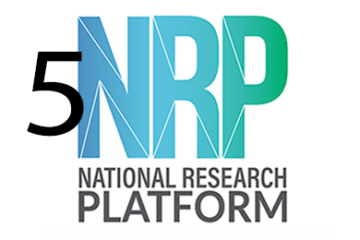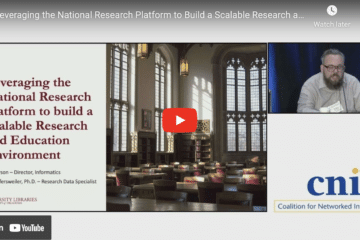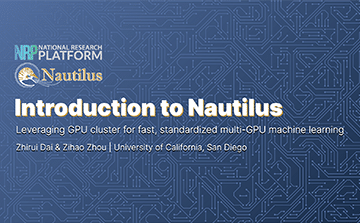
This one-day workshop will focus on the challenges shared between observational astronomy and modern microscopy workflows. Advances in instrumentation, computation and data management for both microscopy and astronomy suggest opportunities for the broader scientific community to learn from the challenges common to both fields. The high-velocity, high-volume data generated by endeavors such as the Large Synoptic Survey Telescope (LSST) or the Square Kilometer Array (SKA) will require new techniques and cyberinfrastructure such as that provided by the Pacific Research Platform to handle the data they will produce. Best practices developed in these contexts may be applied to other domains.
We will introduce some of the challenges in microscopy and provide a survey of the techniques available to astronomers to deal with the ever-increasing flow of data, such as adopting streaming workflows (versus file-based workflows), Artificial Intelligence and Machine Learning, and GPU-accelerated analysis, as well as storage and data distribution, approaches that scale to the needs of a global community of researchers engaged in advanced microscopy imaging.

Agenda
9:00 am: Registration
10:00 am: Keynote
Keynote Speaker Introduction: Camille Crittenden, UC Berkeley
Ilkay Altintas, Chief Data Science Officer, SDSC, UC San Diego
11:00 am: Panel: Challenges of Advanced Microscopy Workflows
Panel Moderator: Jeffrey Weekley, UC Merced
Johannes Schoeneberg, UC Berkeley
12:00 pm: Lunch Roundtables
12:45 pm: Panel: AI in Astronomy
Panel Moderator: Shawfeng Dong, SLAC (formerly UC Santa Cruz)
J. Xavier Prochaska, UC Santa Cruz
Warren Morningstar, Stanford University
2:00 pm: Panel: Advanced Cyberinfrastructure Engineering
Panel Moderator: Thomas DeFanti, UC San Diego
Shawfeng Dong, SLAC (formerly UC Santa Cruz)
Yee Ting Li, SLAC/Stanford University
3:00 pm: Closing Remarks
Camille Crittenden, CITRIS and the Banatao Institute
3:15 pm: Adjourn

“It turns out that the challenges of peering into the universe are similar to those associated with peering into a microscope.”
-Larry Smarr, Principal Investigator of the Pacific Research Platform, Director, Qualcomm Institute.

Program Committee: Jeffrey Weekley (jdweekley@ucmerced.edu), Camille Crittenden (ccrittenden@berkeley.edu), Shawfeng Dong (shaw@ucsc.edu), Lorie Mariano (lorie@citris-uc.org), Mark Yashar (myashar@berkeley.edu).
Funding provided by CITRIS and the Banatao Institute, UC Santa Cruz and UC Merced, in collaboration with the Pacific Research Platform. Funding provided by the National Science Foundation, award #ACI-1541349.
Slides
Stanford/SLAC Cryo-EM Computing and Storage, Yee-Ting Li
Deep Learning of Astronomical Spectroscopy, J. Xavier Prochaska
NERSC, AI and the Superfacility, Debbie Bard
Fast and Automated Analysis of Interferometric Images of h3 Gravitational lenses, Warren Morningstar
Deep Learning Applied to Galaxy Evolution: Identifying and Characterizing Star-Forming Stellar Clumps, C Lee
RESEARCH CYBERINFRASTRUCTURE Jeff Weekly
NERSC, AI and the Superfacility, Debbie Bard
Autoencoding RNN for Inference on Unevenly Sampled Time-series data – Josh Bloom
AstroGANS – David Reiman
PRP Distributed Kubernetes Cluster
Contact:
Program Information:
Jeffrey Weekley, UC Merced, jdweekley@ucmerced.edu
Logistics:
Lorie Mariano, CITRIS and the Banatao Institute, lorie@citris.uc-org


